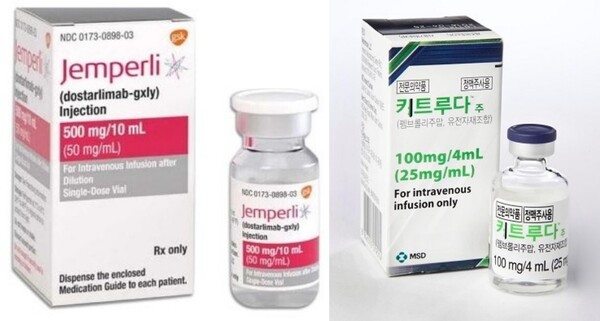Two immunotherapies – GSK’s Jemperli (dostalimab) and MSD’s Keytruda (pembrolizumab) – are attempting to receive insurance benefits for endometrial cancer treatment where there have been no treatments receiving reimbursement except for existing anticancer therapies.

Jemperli has completed applying for insurance coverage, and Keytruda is preparing documents to do so.
Keytruda got ahead of Jemperli in obtaining an indication for solenoma by getting a nod from the Ministry of Food and Drug Safety in December 2021.
The ministry approved the combination therapy of Keytruda and Lenviama (lenvatinib) to treat progressive endometrial cancer patients with confirmed progression after previous systemic therapy and without microsatellite instability-high (MSI-H) or mismatch repair deficient (dMMR).
The combination therapy received (incomplete) approval from the ministry based on KEYNOTE-146/Study 111), a phase clinical trial, in May 2020. In addition, the ministry gave final approval based on the phase 3 clinical trial of the KEYNOTE-775 study. The study confirmed the efficacy and safety of Keytruda-Lenvima combo therapy in treating progressive endometrial cancer patients who have received at least one platinum-based chemotherapy of all treatments, including preoperative and postoperative adjuvant therapy.
As a result of the study, the Keytruda-Lenvima combo therapy confirmed statistically significant improvement in overall survival (OS) and progression-free survival (PFS) by reducing death risk by 32 percent compared to chemotherapy (doxorubicin or paclitaxel) and lowering progression or death risk by 40 percent.
The median value of overall survival (mOS) was 17.4 months for the Keytruda-Lenvima group and 12 months for the chemotherapy group, and the median value of progression-free survival (mPFS) was 6.6 months vs. 3.8 months.
The incidence of significant adverse reactions (≥3 percent) in the Kitruda-Lenbatinib combination group was reported to be 50 percent, including hypertension (4.4 percent) and urinary tract infection (3.2 percent).
Jemperli won regulatory approval in December last year. It was the third PD-1 inhibitor (immunosuppressor) that won domestic approval as monotherapy for adult patients with recurrent and progressive dMMR/MSI-H endometrial cancer with confirmed progression during or after platinum-based systemic therapy.
Jemperli is given once every three weeks for four cycles as 500mg intravenous injections. Afterward, it is administered in 1,000mg dose every six weeks if the disease progresses or expresses severe toxicity.
Jemperli’s approval was made based on the analysis of cohort A1 where recurrent or progressive dMMR/MSI-H endometrial cancer patients are registered. Those patients showed disease progression during or after plastic-based systemic chemotherapy during multiple-cohort GARNET phase 1 clinical trial for recurrent or progressive solid cancer patients.
The cohort comprised 143 participants, the largest scale among PD-1 mono immunotherapies for dMMR/MSI-H endometrial cancer patients.
According to an updated GARNET study, the overall response (OR) rate of dMMR recurrent or progressive endometrial cancer patients was 45.5 percent, with complete remission (CR) and partial remission (PR) rates of 16.1 percent and 29.4 percent.
During the 27.6 months of the central follow-up period, mPFS was six months, and in the follow-up of 24 months, the PFS possibility was 40.1 percent. It failed to reach the median value of the duration of response (DoR) and OS, with 96.8 percent of patients showing responses for six months or more.
The most commonly reported adverse reactions in patients with safety assessment included fatigue, lethargy, nausea, and diarrhea. The most commonly reported level 3-4 or higher reactions were anemia and increased transaminase.
Although not based on direct comparison, Jemperli showed similar clinical usefulness to Keytruda-Lenvima combo therapy and was added to the Pan-Asian Guidelines Adaptation (PAGA) on endometrial cancer, updated most recently.
PAGA is a treatment guideline for Asian countries based on the European Society for Medical Oncology (ESMO) guidelines.
“Jemperli showed sufficient effects through the GARNET study. Also, a considerable number of 143 patients participated in it,” said Professor Kim Young-saeng of the Department of Oncology at Gachon University Gil Medical Center, commenting on the guideline change. “From the standpoint of medical professionals, immunotherapeutic options have increased, and an environment to use them as a standard treatment seems to be created.”
Professor Kim said he would say “yes” if asked whether Jemperli is a standard treatment because chemotherapy produces too few effects when used as a secondary treatment.
“Jemperli has clear biomarkers and confirmed efficacy through clinical trials, so we should regard it as a standard treatment without undergoing phase 3 clinical trial,” he said.
Kim noted that if the two treatments receive insurance benefits, it will change the treatment environment considerably.
“Although there is Keytruda-Lenvima combo therapy, its financial burdens are considerable for patients. As Jemperli monotherapy showed a response rate of 40 percent or more, it has become a ‘must” treatment,” he added.

